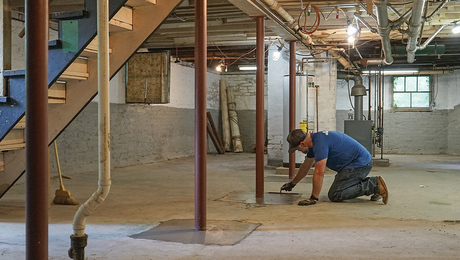*
WE have a well, not to deep about 70′, problem is the well is in an organic layer which is causing hydrogen sulfide. There is also a large amount of iron in the water we have an excellent water softner “Kinetico” but we would still like a high end filter to take out the iron. Chlorination is not an option.
Discussion Forum
Discussion Forum
Up Next
Video Shorts
Featured Story

Upgrading the footings and columns that support a girder beam is an opportunity to level out the floor above.
Highlights
"I have learned so much thanks to the searchable articles on the FHB website. I can confidently say that I expect to be a life-long subscriber." - M.K.














Replies
*
I'll try and keep this brief....
If there are high levels of iron, in the long run it's cheaper to drill a new well!! (I know, not going to do that)
If the water contains less than 1.0mg/l of iron and less than 0.3mg/l on manganese add polyphosphates, chlorinate and then allow the water to settle out. (Use a carbon filter post settlement tank or prior to drinking, to remove the chlorine.) Any of the polyphosphates can be used, eg pyrophosphate, tripolyphosphate or metaphosphate.
It's possible to add high doses of chlorine, oxidize the iron to a precipitate and then filter it out, (5 micron paper filters followed by a 5 micron carbon to remove the chlorine)
As you can see from the above there has to be a storage tank (for holding times) and some form of chlorination (sorry).
It is also possible for iron bacteria to grow in all types of filter element. Just when you think that you've got rid of the iron, it appears again, that's why so many treatment plants use chlorine to oxidize the iron.
In any case the MCL (Maximum Contaminate Level) for iron is 0.3mg/l in drinking water.
*Gerard, I am a distributor of a high end water filter produced by a very reputable company in NV. The filter is of a solid carbon block design. It will remove iron rust particlesdown to 0.5 microns. Dissolved iron, on the other hand is not removed. You must remember though that a certian amount of Iron is essential for the maintenance of red blood cells (US RDA is 18mg/day). If you want more info on these filters you can call the company direct at 800-622-9206, e-mail them at [email protected], check out their web site at http://www.multipureco.com, or you can e-mail me at [email protected]. Good luck!James Smallwood
*
I'd question, though, whether your body can assimilate iron in the form of your contaminates. Sucking on a bar of iron won't work either.
*Andrew,I had always understood that sufficient dietary iron was not a problem for a long time since so much cooking was done in iron skillets. So I would think that the iron in the water might work, and that sucking on the iron probably would work.Then again, maybe the iron skillet story is fiction.Rich Beckman
*
*
Seek alternate water. I am doing this on a property I own and the cost is about $50.00 per month. This summer I will have to replace the zeolite in the commercial softener due to tannin contamination - the softner is about 20 months old. The turbidity and activated charcoal filters, if done on an other than disposable scale (my case with double 5micron and double activated charcoal before the softener) require a bigger pump, a storage tank and a chlorination pump and associated monitoring equipment. Fortunately, for me all I have to do is annex to the city to get water - and higher taxes.
Dennis
*
A solid block carbon filter at the point of use for consumption is the best way to ensure all contaminates have been removed. E-mail me for more info.
*If you have the money, you can go to ultra filtration or RO (reverse osmosis). RO is the best, it removes everything but the wet, but it is the most expensive. There are two factors in RO cost, the cost of the filters and the electrical cost of the pump (you need 120 to 150 psi). Ultra filtration is essentially what Barry described (with chemical treatement tossed in)
*Becareful of just one type of water processing (ie: Tim's comment on just using a carbon block). The carbon itself will not remove particulate matter, biological contanimants, or any type of organic/inorganic solvent that does not bind to carbon (though you may get some removal from the filtration built into a particular system).
*
WE have a well, not to deep about 70', problem is the well is in an organic layer which is causing hydrogen sulfide. There is also a large amount of iron in the water we have an excellent water softner "Kinetico" but we would still like a high end filter to take out the iron. Chlorination is not an option.